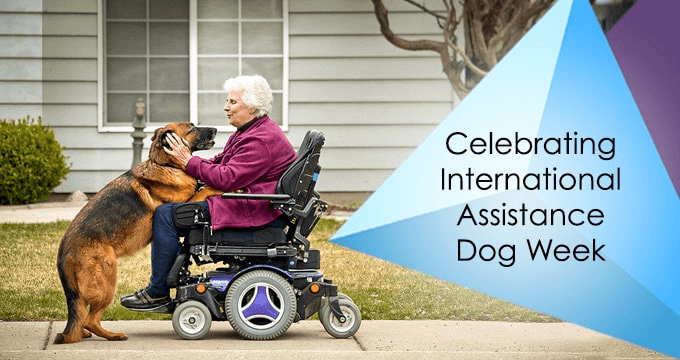“Dogs lead us to places we didn’t even know or wanted to go” – Steeve Coogan
While this is true figuratively, there are some dogs who literally take you to places you didn’t know about. And they are the hero without capes. Those that guide you like the North Star. They act as your anchor in a world without light. We are talking about Guide dogs.
This entire week(August 4 – August 10) is celebrated in honor of these heroic dogs as International Assistance Dog Week (IADW).
The Guide dogs are primarily employed by blind and visually impaired people. These dogs help them navigate by guiding them and ensuring that they can avoid obstacles in their path. These assistance dogs are also known as seeing-eye dogs or service animals. They are usually allowed in restaurants and other places that do not allow pets inside. This is because the people making use of those dogs need their support and these dogs are usually better trained than other pets.
Qualities required to become a Guide Dog
Guide dogs need to be gentle, intelligent and caring. All these qualities are required for them to be selected for training. Once they clear the training which by the way is extremely comprehensive, they are then assigned to people who require them.
Most popular breeds that are usually chosen as Guide Dogs
- Golden Retrievers
- Labradors
- German Shepherds
These are preferred as guide dogs for their innate intelligence and for the ease with which they can be trained.
History
The use of guide dogs was pioneered in Germany after World War I to help army veterans who were blinded in battle. It took time for American and British people to take to the concept of guide dogs. But eventually, after realizing the benefits Americans and Britons enthusiastically adopted the use of guide dogs.
Guide dogs in establishments
Guide dogs are allowed into most places in which animals are not allowed, as mentioned before. This is for the person they are accompanying will require their help. In addition, it is a well-known fact that guide dogs are well trained and disciplined. However, there are still some places that do not allow dogs either for reasons pertaining to religion or sanitation. While it can be argued that guide dogs are still required, it would be better to avoid such places.
It is to be noted that people should not play with guide dogs in public places which might cause the dog to become distracted. This could prove dangerous for the human whom they are guiding.
Benefits of having a guide dog
All dogs need exercise by walking. This requires the person using the guide dog to also go along with it resulting in exercise for both parties, making them healthier. It has been found that having a service dog helps people feel more independent since they do not have to wait for other people to come and assist them in moving around.
Most people who make use of guide dogs consider the dogs as part of their family resulting in closer bonding. The bonding stimulates hormones that reduce stress levels in both the human and the dog.
In addition, when visually challenged people employ guide dogs to assist them in unfamiliar places, it results in more confident navigation of that new place. The dog guides them on the path, resulting in a faster pace and a safer environment.
Most of all, having a guide dog has been found to reduce anxiety and depression in addition to relieving loneliness. This has resulted in a sub-category of therapy dogs. Therapy dogs are trained to provide love and comfort to people who may be sick or hospitalized.
All in all, having a guide dog can be extremely beneficial. There have been a few instances in which people using guide dogs have been saved due to the intelligence exhibited by the dog in a critical situation. Also, several people have found love and affection in the form of their furry friends. Thus, it is necessary to understand and encourage the use of guide dogs.
On the eve of International Assistance Dog Week (IADW), we would love to hear from you exciting stories about Guide Dogs and their services to the human community.









